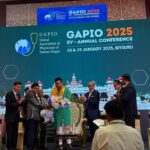India’s Ministry of Environment, Forest and Climate Change (MoEFCC), in collaboration with The Lakshmi Mittal and Family South Asia Institute and the Salata Institute for Climate and Sustainability at Harvard University, is set to host a pivotal conference, India 2047: Building a Climate-Resilient Future, from March 19-22, 2025, at Bharat Mandapam, New Delhi.
This conference aims to address key adaptation challenges and refine India’s climate response through strategic policies, programs, and on-ground action. As India approaches its centenary of independence in 2047, the event will serve as a crucial platform for innovation, collaboration, and evidence-based policymaking, according to MoEFCC.
The inaugural session will feature Vice Chairperson of NITI Aayog, Suman Bery, and Union Minister of State for Environment, Forest and Climate Change, Kirti Vardhan Singh. Other esteemed speakers include government officials, industry leaders, and prominent academics from Harvard University. Notably, Director of The Lakshmi Mittal and Family South Asia Institute, Prof. Tarun Khanna, Vice Provost for Climate and Sustainability at Harvard University, Prof. Jim Stock, and Professor of Environmental Science and Engineering, Prof. Daniel P. Schrag, will address key discussions.
The four-day event will include multiple breakout and technical sessions focused on adaptation and resilience across four key themes: (i) Climate Science and its implications on Water & Agriculture, (ii) Health, (iii) Work, and (iv) Built Environment.
Cross-cutting topics such as governance, traditional knowledge, livelihoods and skill development, gender inclusivity, and climate financing will also be explored. The conference aims to produce concrete outputs, including research papers, technical reports, and policy briefs, contributing to global climate adaptation initiatives.
“This event will be a special opportunity to discuss adaptation and resilience to climate change amongst a receptive and influential audience in a location where this issue is an immediate concern,” the MoEFCC statement emphasized.
With an interdisciplinary approach, the conference will facilitate meaningful discussions on sustainable development strategies, ensuring India’s National Adaptation Plan is informed by scientific research, policy insights, and inclusive development goals.
“With a focus on policy integration, scientific advancements, and localized adaptation strategies, the Conference aims to bridge critical knowledge gaps that hinder effective climate planning,” it added.






